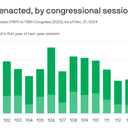Democrats aren't ruling out rescuing Trump's big bill
Some moderate House Democrats are keeping the door open to supporting the massive tax, border and energy package President-elect Trump and Republicans are concocting — if the price is right.
Why it matters: House Speaker Mike Johnson (R-La.) has virtually no room for error to pass the bill along party lines, and some of his right-wing hardliners are harshly conditioning their votes.
- "One of several, for me, 'bright lines,' 'red lines,' however you want to say it, is deficit reduction," Rep. Chip Roy (R-Texas) told reporters on Thursday.
- That could be a heavy lift with Republicans planning trillions in tax cut extensions, on top of funding for things like enhanced border security.
What we're hearing: The main way Republicans could try to entice some breakaway Democratic support is through raising the $10,000 cap on the state and local tax (SALT) deduction.
- That would put money directly into the pockets of suburbanites in high-tax blue states like California, New York and New Jersey.
- "I'm not going to say what I will support or not support until I see the specifics, but I think SALT is critically important ... and this is a huge opportunity to bring SALT back fully," said Rep. Josh Gottheimer (D-N.J.).
- Rep. George Latimer (D-N.Y.) told Axios, "Obviously I like full SALT restoration, but let's see where the negotiations take us. ... The doors are open for whatever helps."
State of play: Some of the House GOP's most ardent advocates for SALT, like Rep. Mike Lawler (R-N.Y.), are pushing hard to include a generous provision in the bill and are going to Mar-a-Lago this weekend to make their case.
- Trump said on the 2024 campaign trail he would reverse the SALT cap that was part of the 2017 tax bill he signed into law.
- But the high price tag of that policy could make it a tough sell for deficit hawks like Roy, who told reporters, "Obviously, if you significantly lift or eliminate the cap, there's a fairly significant impact in terms of revenues."
The intrigue: Some of the other centrist Democrats who may be inclined to give the package a fair look would be turned off by the inclusion of a strong SALT provision.
- Rep. Jared Golden (D-Maine), who represents a working-class, rural district, told Axios he would support the bill "if there's stuff in there that's good for Maine or that I like."
- But, he added, "I don't like SALT. It's just a huge giveaway to the top 10%, and I care about the deficit. So that's a bad start."
Reality check: Extending the Trump tax cuts could ultimately be a bridge too far for most Democrats, with House Minority Leader Hakeem Jeffries (D-N.Y.) calling the package the "GOP tax scam part two" at a press conference on Wednesday.
- "Wasting trillions of dollars on tax giveaways to the super-wealthy is offensive on its face," said centrist Rep. Greg Landsman (D-Ohio).
- Rep. Tom Suozzi (D-N.Y.) said it would be "very hard to support a tax bill that reduces corporate taxes, that doesn't put the top rate back to where it was."
Johnson, asked by Axios if he is willing to work with Democrats on the legislation, said: "We welcome all Democrats to vote for a good package. This is going to be great legislation. It's an America First agenda, but it follows common sense."
- Trump appears to be willing to take Democratic input: Sen. John Fetterman (D-Pa.) told reporters Thursday he plans to make a trek to Mar-a-Lago this weekend.
The bottom line: Even skeptical Democrats say they are ready to talk if things fall apart for Johnson and he decides to engage with them.
- "They're going to want to do this on their own," said Landsman. "If they can't because of the slim majority, obviously they're going to need our help. And that's when the bipartisan magic happens."







































